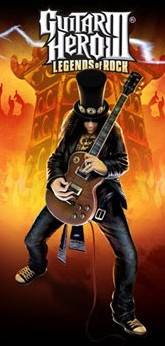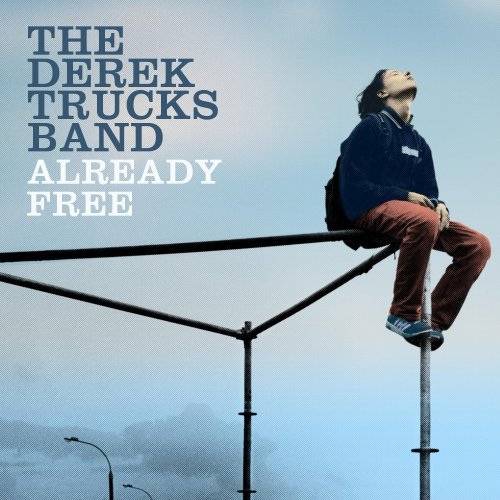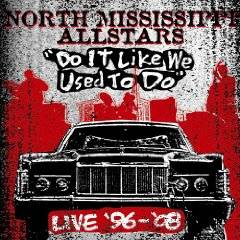 I suppose it will seem the height of irony to claim that a culture whose members spend much of their free time writhing in Guitar Hero-induced, six string-shredding ecstasy has largely turned its back on the lead guitar as a dominant force. But examine closely the reductive, even comic way in which the various music-based video games present the rock and guitar-playing enterprises and the claim begins to gain credence. An undeniable icon of the rock universe, the guitar is omnipresent without being understood, “worshipped” without reason. Turning the guitar hero figure into a video game means reducing its complexities to lowest common denominator levels. In a sense, the very ubiquity of the guitar as a cultural signifier is sign of its diminished importance.
I suppose it will seem the height of irony to claim that a culture whose members spend much of their free time writhing in Guitar Hero-induced, six string-shredding ecstasy has largely turned its back on the lead guitar as a dominant force. But examine closely the reductive, even comic way in which the various music-based video games present the rock and guitar-playing enterprises and the claim begins to gain credence. An undeniable icon of the rock universe, the guitar is omnipresent without being understood, “worshipped” without reason. Turning the guitar hero figure into a video game means reducing its complexities to lowest common denominator levels. In a sense, the very ubiquity of the guitar as a cultural signifier is sign of its diminished importance.
The common explanation for this perceived change is easy: punk and its equally twitchy stepchild indie rock kinda rendered anything even faintly self-indulgent taboo, at least when it came to overt demonstration of instrumental prowess. Obviously, punk and indie countenanced other over-the-top gestures, but rarely any of an improvisational or virtuoso nature. And while metal and its blitzed cousin stoner rock continue to demand axe proficiency, it’s largely of a proscribed or predictable nature: power chords and lower register riffs couched in buckets of down-tuned sludge, interrupted by interludes of scatter-shot super-fast note-flinging and the usual tapped or hammered eccentricities. At first glance, the jam band route seems to offer the purest form of musical expression, but examine it closely and you see clear orthodoxies, obvious limits. And then there’s the blues, the other guitar-centered genre where most of the old dinosaurs go to spend their last playing days. While it might have the virtue (or illusion, as the case may be) of authenticity, the blues is a slippery, feel-centered domain where few rock players are ever truly comfortable. Awed by the heroes of their youth, overwhelmed by the purity and ease of their mentor’s playing, most rock-players-turned-blues-purists seem too polished, too rehearsed, too safe in comparison. And you don’t need to have watched American Idol to know that contemporary popular music of almost any genre no longer cares about guitar playing prowess, if it ever really did.
As that last bit suggests, one could argue that the virtuoso player has always been something of a problem in rock music. Yes, most rock music is anchored in Guitarsville. No question. But as no less an authority than Pete Townshend opined in “Join Together,” “It’s the singer not the song that makes the music move along.” Even if you don’t accept that the inevitable guitarist/singer stand-off typically favors the latter, the fact is guitarists who become a principal focal point are almost always susceptible to the same set of fears and/or criticisms: they can’t sing; they can’t write; they’re way better live than in the studio. The standard take on rock guitarists defined more or less exclusively by their playing is this: left to their own devices, they are content to immerse themselves and their audience in sheets and sheets of unfiltered, uncontrolled sonic spew, an overwhelming experience, to be sure, but one of short-lived meaning and value.
So any guitar player worth a good goddamn who wants to counter these notions has fairly limited options from which to choose. Two recent releases, the Derek Trucks Band’s Already Free and North Mississippi Allstars’ 2CD/1DVD live compendium “Do It Like We Used To Do,” successfully demonstrate two distinct paths: subordinating the guitar to the dictates of the group/song and pretending it’s 1970 and playfully and obsessively filtering all genres through rock’s fuzz-drenched elixir.
 Already Free sees Trucks fully immersed in band stew, content to be one of many ingredients as much as anyone with his prodigious talent can be. Yes, his is the name on the box and the pictures in the accompanying booklet make it clear who the star is. That said, the opening cover of Dylan’s “Down in the Flood” screams “group” effort, from the wahed clavinet creak of Kofi Burbridge, to the gritty R&B vocals of Mike Mattison, to the cascading layers of sound that kick in for real on verse two. What strikes you about the inevitable solo is Truck’s patience and attention to tone and feel. Like the best playing it sounds natural: immediate, and perfect. And as the feverish kick back to the verse makes clear he is just as capable of letting go. Above all else this is a beautifully arranged record, covering a wide range of styles, from the country-soul saunter of the Dobe Grayish “Sweet Inspiration” to the Allmans-like acoustic ballad “Our Love.” And check out the wall-to-wall slide beast that is “Down Don’t Bother Me.” Throughout the 12 tracks, attention to detail is the name of the game, resulting in a fully realized southern R&B/country/blues/guitar hybrid that Eric Clapton, Trucks’ sometimes boss, wishes he could achieve.
Already Free sees Trucks fully immersed in band stew, content to be one of many ingredients as much as anyone with his prodigious talent can be. Yes, his is the name on the box and the pictures in the accompanying booklet make it clear who the star is. That said, the opening cover of Dylan’s “Down in the Flood” screams “group” effort, from the wahed clavinet creak of Kofi Burbridge, to the gritty R&B vocals of Mike Mattison, to the cascading layers of sound that kick in for real on verse two. What strikes you about the inevitable solo is Truck’s patience and attention to tone and feel. Like the best playing it sounds natural: immediate, and perfect. And as the feverish kick back to the verse makes clear he is just as capable of letting go. Above all else this is a beautifully arranged record, covering a wide range of styles, from the country-soul saunter of the Dobe Grayish “Sweet Inspiration” to the Allmans-like acoustic ballad “Our Love.” And check out the wall-to-wall slide beast that is “Down Don’t Bother Me.” Throughout the 12 tracks, attention to detail is the name of the game, resulting in a fully realized southern R&B/country/blues/guitar hybrid that Eric Clapton, Trucks’ sometimes boss, wishes he could achieve.
 Luther Dickinson has other hurdles to tackle: he’s North Mississippi Allstars’ principal vocalist, and let’s be kind and say that ain’t necessarily a strength. On top of that, songwriting has been an ongoing concern for the band as they moved beyond the carefully chosen covers of their debut. Similarly, their continuing dalliance with jam band looseness has yielded mixed results. All of which means their studio output has been patchy to this point. None of which matters when the boys lace up their boots and play for real. And this new live set adds historical evidence of their stage spark, over and above that provided by their first live outing, the equally phenomenal Hill Country Revue. Through it all, from the swamp swagger of “Down in Mississippi’ to the extended medley jams of “Jr/Stay All Night/Lord Have Mercy” and “Po’ Black Maddie/Skinny Woman,” Luther piles rock-informed jam on top of jam, adding that little extra bite and distortion that owes more to Hendrix and the usual British blues rock titans than it does to the R.L. Burnsides and Jr. Kimbroughs of his upbringing. And he regularly follows the example of the second wave of British blues rock outfits following in the wake of Cream and Hendrix, transcending his source material to go somewhere else entirely, like, say, the stratosphere. Check out the astral bridges assembled in the aforementioned “Maddie/Woman” medley. It’s cosmic blues, that lovechild of ’60s experimentation and earthy roots music, and as such, it extols the strange and substantial virtues of the hybrid form.
Luther Dickinson has other hurdles to tackle: he’s North Mississippi Allstars’ principal vocalist, and let’s be kind and say that ain’t necessarily a strength. On top of that, songwriting has been an ongoing concern for the band as they moved beyond the carefully chosen covers of their debut. Similarly, their continuing dalliance with jam band looseness has yielded mixed results. All of which means their studio output has been patchy to this point. None of which matters when the boys lace up their boots and play for real. And this new live set adds historical evidence of their stage spark, over and above that provided by their first live outing, the equally phenomenal Hill Country Revue. Through it all, from the swamp swagger of “Down in Mississippi’ to the extended medley jams of “Jr/Stay All Night/Lord Have Mercy” and “Po’ Black Maddie/Skinny Woman,” Luther piles rock-informed jam on top of jam, adding that little extra bite and distortion that owes more to Hendrix and the usual British blues rock titans than it does to the R.L. Burnsides and Jr. Kimbroughs of his upbringing. And he regularly follows the example of the second wave of British blues rock outfits following in the wake of Cream and Hendrix, transcending his source material to go somewhere else entirely, like, say, the stratosphere. Check out the astral bridges assembled in the aforementioned “Maddie/Woman” medley. It’s cosmic blues, that lovechild of ’60s experimentation and earthy roots music, and as such, it extols the strange and substantial virtues of the hybrid form.
As the “Part I” in my title suggests, this will be an occasional series. If you have ideas of other guitarists to consider, give me a holler. I already have Earthless’ Isaiah Mitchell in the pipeline, a guy who pretty much just leans back and wails, twenty-five minutes at a time. “I got blisters on my fingers,” indeed.
——
Already Free is available on CD and vinyl via the Victor label.
“Do It Like We Used To Do” is available as a 2CD/1 DVD package via Songs of the South.








